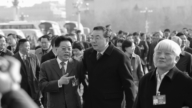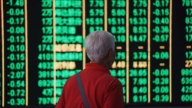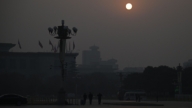【新唐人2013年03月18日讯】中共为何不崩溃?很多观察家曾反复指出,中国正面临严峻的社会、政治紧张局势、和日益扩张的贫富不均,以及腐败。跟那些被颠覆的阿拉伯国家并无两样。然而,所谓的“中国之春”,终究没有像大多数人所预期的发生。那么,“中国之春”何时来?大陆学者对此作出各种分析。
“中央民族大学”哲学和宗教学系教授赵士林指出,中国社会确实存在很多严重问题。贫富悬殊,特权泛滥,经济节奏,包括社会、经济、政治,方方面面。但是中国老百姓没有爆发颠覆性革命,跟过去三十年的经济迅速发展,成为世界第二大经济体有很大关系。
中央民族大学哲学和宗教学系教授赵士林:“中国还是一个幅员辽阔,发展极不平衡的国家。经济发展的巨大成果当然在分配方面有严重问题。但是中国人毕竟也在改革开放获得了巨大收益。”
前国务院农村发展研究中心、中共中央农村政策研究室研究员姚监复也认同,经济因素起到重要作用。
前国务院农村发展研究中心研究员姚监复:“GDP很高的时候,他的分配即使不均匀,但是最低收入的人跟十年前比,跟三十年前比,还是提高了。所以是相对贫困化,不是绝对贫困化。这样的话,老百姓能忍受。人们一说,比以前好了,老百姓能忍受。”
赵士林指出,中国没有发生革命,跟中国人吃苦、忍耐的民族性,以及共产党这个严厉的国家机器也有关系。
赵士林:“中国人你知道是非常能吃苦的,也是非常能忍受的,只要是有口饭吃,他一般是不会造反的。另外,你也知道中国(共)政府的执政能力,中国(共)的国家机器也是空前强大,他会不惜代价,也要维护国家稳定。”
另外,姚监复认为,中国人的强烈民族主义情感,也是“茉莉花革命”在中国没有发生的原因之一。
姚监复:“所以几百年中国受了列强的压迫。特别是日本,特别是八国联军,老百姓有一个强烈的民族自尊心。所以只要你国家强了,老百姓觉得我也可以忍受一点,承受一点。现在习近平用了民族复兴这个口号,能凝聚民心。”
美国“桥港大学”助理教授赫斯在《外交家》杂志撰文说,中国发生的抗议多数针对局部性问题,于局部性区域发生,如基层官员腐败或征地事务等,除1989年震撼人心的“六四”事件,抗议者并没有将活动发展成全国范围的意愿,也少有针对中央政府的倾向。
赵士林:“中国的整体比如政治体制问题,改革问题,关注的人当然还是大有人在。比如知识份子群体,更多的关注这个问题。他们也经常就中国的整体问题,中国的大政方针问题,中国的改革问题不断的提出意见。通过网络、通过其他形式。”
姚监复也指出,如果经济剧烈下滑,社会矛盾进一步激化,中国就可能出现大规模动荡。
姚监复:“经济下滑,大量失业。两亿农民工大部分失业。四千万农民工已经成了失地农民,回农村也没有地的话,这时候中国会出现混乱。而这个混乱就可能引发政治社会的巨大矛盾。因此现在讲发展是硬道理,是逼不得已。整个执政的合法性基础,就建立在经济高速发展、GDP的增长上。”
《经济学人》3月16号评论说,在中国知识份子圈子里,正流行阅读托维尔的《旧制度与大革命》,一本讲述“1856年法国大革命”的书。这本书跟中国现状最有共鸣的是,旧制度在革命中倒下不是因为他们抵制变革,而是他们试图改革却打破了他们的期待。如果托维尔说的是对的,那么习近平将面临一个无解的困境,那就是:为了生存,共产党需要改革;但是改革本身可能成为最大的危险。
采访编辑/秦雪 后制/葛雷
CCP’Regime Yet to Crash: When Will"China Spring"Come?
Why has the Chinese Communist Party’s (CCP) regime
not collapsed yet, many people keep asking themselves.
A lot of China affairs observers repeatedly talked about
China’s severe social problems, intense political situation, growing rich-poor gap, and ubiquitous corruption.
All these differ little from the circumstances
in the Arabian regimes when they were overturned.
Yet, “China Spring"has not arrived yet,
despite being longed for and awaited by many.
When will the “China Spring” break out?
Mainland scholars share their opinions on the topic.
Zhao Shilin, professor at China’s Minzu University,
remarked, China has indeed some serious problems.
Like the wealth inequality, rampant privilege,
and other social, economic, and political issues.
However, the Chinese people have not tried to overturn
the CCP regime through revolution.
This has a lot to do with the economic development
in the past 30 years, during which China has become the second largest economy in the world.
Zhao Shilin: “China is still a huge country
with extremely imbalanced development.
It is true that there are some severe problems
in distributing the fruits of economic development.
But after all the Chinese people have benefited
a lot from the economic reform."
Yao Jianfu, former researcher at the CCP central rural policy
research office, also agrees that the economic factor plays a key role in this issue.
Yao Jianfu: “Even with an imbalanced distribution,
the overall GDP level is much higher,
the incomes of the poorest people have still improved
compared to that of 10 or 30 years ago.
Therefore the pauperization is only a relative one,
not an absolute one.
In such a case the ordinary people can still tolerate,
by telling themselves that the life is better than before."
Zhao Shilin added, China has not seen any revolution yet,
also due to Chinese having a tradition of bearing hardships.
In addition, the CCP has a very strict system
of controlling the nation.
Zhao Shilin: “You know that the Chinese can bear hardships,
and they are capable of enduring a lot.
As long as they have something to eat
they won’t easily revolt.
Moreover, the CCP is famous for its “ruling" capability.
It has an unprecedented powerful bureaucracy,
and it has the determination to maintain the “stability"
of its regime at any cost."
Yao Jianfu further remarked that Chinese people
generally have a strong sentiment of patriotism,
which is another reason
why the Arab Spring has not taken place in China.
Yao Jianfu: “In the late hundreds years, China has been
oppressed by powers, like Japan and Eight-Nation Alliance.
Therefore the Chinese people have
a strong national pride’sentiment.
They are willing to tolerate to some extent,
provided that the country becomes stronger as a whole.
Currently, Xi Jinping throws out the slogan of national
rejuvenation to bid for more support by the people."
Steve Hess, an assistant professor at University
of Bridgeport, wrote an article for the magazine Diplomat.
He remarked that most China’s mass protests are restricted
in a local area, and are directed against local issues such as corruption or expropriation by local officials.
Except the striking “June 4 Incident"in 1989, very few
protesters attempted to extend activities nationwide,
or were inclined to direct them
against the central government.
Zhao Shilin: “Of course there are many caring about China’s
issues as a whole, such as the political reform.
For example, the group of intellectuals
cares more about this.
They frequently put forward opinions about China’s issues
as a whole or overall policies, either on the Internet or using other means."
Yao Jianfu believes that if the economy declines sharply
and the social conflicts become more intense, it is possible to see larger-scale turbulence in China.
Yao Jianfu: “An economic downturn will lead
to a massive unemployment.
If most of the 200 million migrant workers lose their jobs,
40 million of them will become farmers without a land,
because they have no land to work on,
even if they go back home in the countryside.
In such a case China may slide into anarchy, which can then
lead to huge conflicts in politics and the Chinese society.
Therefore now the CCP believes in
“Development is of overriding importance."
The regime’s legitimacy lies
in the rapid economic development and the GDP."
The Economist wrote on Mar 16,
“There is a vogue in Chinese intellectual circles
for reading Alexis de Tocqueville’s 1856 book on the
French Revolution, ‘The Old Regime and the Revolution’.
The argument that most resonates in China is that old
regimes fall to revolutions not when they resist change,
but when they attempt reform
yet dash the raised expectations they have evoked.
If de Tocqueville was right, Mr Xi faces an impossible
dilemma: to survive, the party needs to reform; but reform itself may be the biggest danger."




























